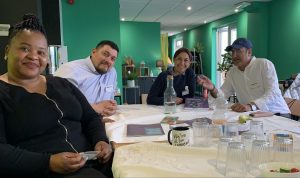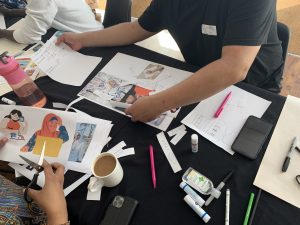Community food providers in Glasgow will soon be able to take part in a new Dignity in Practice workshop series. These workshops focus on the specific challenges people in the asylum process are facing and the small but meaningful changes that could help enhance the dignity of people coming to their services.
The workshops are run in partnership with the Food for All Group, people who have lived experience of the asylum process and food insecurity and who are working to promote change. From conducting community research about local service provision to hosting local radio programmes, the group has brought a strong and important focus to the experiences of navigating and living through the everyday challenges of being in the asylum process. The group is supported by the Govan Community Project, with funding from the Scottish Government.
I have experienced food poverty first-hand and also heard equally heart breaking testimonies of a lot of other people. Therefore I value this opportunity of a platform to let it all out. And not just venting but to have the unique opportunity of shaping policy, services and above all changing mindsets.
– Group member

We worked with the Food for All Group to develop a workshop series for people who design and deliver services in Glasgow. The workshops will provide an opportunity for participants to learn about the asylum process, reflect on real life examples and consider ways they could improve how they engage with asylum seekers in their community.
Register for an online workshop here.
Journey so far
The Food for All Group started in 2020 with a research project to explore the experience of food insecurity for asylum seekers in Glasgow. This research revealed that asylum seekers’ experience of community food services differed from people who are citizens or can access public support. Moreover, it showed that many people who are not subject to immigration controls were not aware of the restrictions the asylum system puts on people. For example, restrictions include not being allowed to work or not being able to receive benefits and other support (‘no recourse to public funds’).
It is important for people to know, there are people who are facing food insecurity due to the difficult routes of the asylum system which makes them incapable of meeting their basic needs.
– Group member
This lack of understanding about the asylum process and constraints asylum seekers are under was creating problems for staff, volunteers and people trying to take part in these services.
So, the first step the group took was to design an easy-to-understand flyer with key information about the asylum process for staff and volunteers to use in their projects.
The group’s research also showed that people in the asylum system often felt misunderstood and excluded from community food settings. This is partly due to the lack of awareness of the financial constraints people are under. It also related to wider prejudices and distrust of people in the asylum process. As one group member explained:
We are just human beings who are trying to survive with the little that we have. We survive on the bare minimum, the minimum that fails to meet our needs. I will take on every opportunity to survive, if I can get the opportunity. Living in a restricted environment where I have to beg for food is inhumane. It makes me feel like I am less worthy.
– Group member

The group wanted to find a way for people to understand what these ‘everyday challenges’ look and feel like for people who are in the asylum process. So, the second step was to develop a set of images that could be used as discussion prompts to help people think about and reflect on the context of specific situations – and the consequences for people’s dignity.
This work was supported by Martha Adonai Williams and based on an approach developed by Paulo Freire.
Finally, the group asked us to help them adapt some of the Dignity in Practice tools to help people think about how their service promoted or undermined the dignity of people in the asylum process.
We worked together throughout 2022 to design a workshop that will bring together staff and volunteers from community food services in Glasgow who want to learn, reflect and start to take action to improve their service. The workshops aim to:
- Raise awareness of the specific experiences and challenges for asylum seekers
- Build empathy towards people in the asylum process
- Encourage action to improve the situation for people now and in the future
Next steps
The Food for All Group members are committed to helping people make positive changes in their services. The workshops and resources they’ve developed will help anyone who designs and delivers community food services in Glasgow to better understand the constraints that people in the asylum process are facing – and how to make changes that will mean people feel welcome, respected, valued and understood.
‘Dignity in Practice: Involving & Learning from the Asylum Community’ workshops will take place February – April 2023.
- Register here for the online workshops 8th or 22nd February.
- Email us if you would like to be kept informed about the in person workshop details: dignity@nourishscotland.org.uk.
I think this project will make an impact on those who already are doing something for asylum seekers, but it will reframe, and refresh their opinion about what is to be in the asylum process, having overwhelming experiences, leaving behind their family members, friends, and the land that saw them grow. And will make an important contribution to raise awareness to the wider public.
– Group member